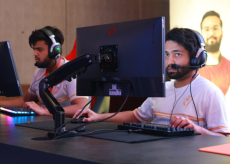China’s restrictive gaming hours policy may be ineffective: Study
Prepend to the content

A study by a group of computer scientists has revealed there is no evidence found of Chinese game playtime restrictions reducing the amount of time spent on the activity. The data for the study was provided by Unity Technologies, a prominent game engine.
China imposed the restrictions back in November 2019 as a way to deal with video game addiction among young people, especially those under the age of 18. Excessive playtime was considered to have a negative impact on productivity which led the government to decide that minors could only access videos games for 90 minutes a day.
These restrictions were made even stricter, starting September 2021. The youngsters could now only access video games on Fridays, Saturdays, Sundays, and public holidays for one hour (8pm-9pm).
Despite that, there was no solid evidence found that the restrictions had any effect on playtime, the study titled “No evidence that Chinese playtime mandates reduced heavy gaming in one segment of the video games industry” concluded.
While Unity is one of the most popular game engines, the study is limited to the games developed by it. According to estimates, Unity is currently the most common game engine to create mobile games.
The dataset considered, however, does not specify the exact age group of the users. Hence, it is hard to specifically estimate the effect of gameplay restrictions on minors. Notably, Unity’s comparative prominence as a game engine in China is unknown which makes it harder to assess different regions.
It was taken into account that minors could also use the accounts of adults in their homes to play the games and bypass the restrictions. The data also revealed that while the gameplay time for an average person was less than an hour, the people engaged in heavy gameplay usually play for around four hours every day for almost the whole week.
This has actually increased the game playtime in total, although by not much. Due to this, a definitive answer is hard to get as the findings can also suggest that the playing for fewer hours by minors might be offset by the increase in playtime by heavy gamers.
The study, however, believes that the findings most plausibly explain that the government policy is ineffective.
“Nonetheless, in order to build on this work, future research must focus on generating data infrastructure: technological frameworks that allow privacy-preserving independent access to large-scale behavioural data fused to relevant self-report or demographic indicators,” it recommended.
The post China’s restrictive gaming hours policy may be ineffective: Study appeared first on G2G News.



